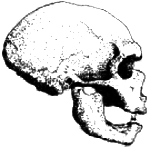AGU Symposia
The American Geophysical Union (AGU) is celebrating its one-hundredth anniversary with a meeting in Washington, D.C., 10-14 December 2018. The meeting includes at least two sessions directly relevant to paleoanthropologists:
- Learning from our Ancestors. Using modern earth science methods to understand ancient practices. Ancient societies interacted with their natural environments in many ways. Taking the waters, imbuing certain stones with special powers, and even ingesting soils for improved health are practices that can be found around the world. Modern earth science allows us to study these practices in greater detail in order to understand their origins and evaluate their efficacy. Modern earth science methods also make it possible for us to understand how ancient societies interacted with the landscape in order to ensure a constant supply of food and water, to secure shelter and protection and to obtain raw materials needed to make tools and wage war. This session welcomes all contributions that allow us to use earth science to understand and learn from the practices of our ancestors.
- Advances in paleoecology and paleoclimate with emphasis on contextualizing human evolutionary history.Paleoecological and paleoclimate data are essential for assessing the geologic context and paleoenvironmental framework of human evolutionary junctures and the origins of our hominin ancestors and non-hominin primate relatives. Geological, geochemical, paleontological, andpaleobotanical data are commonly generated by Earth scientists, archaeologists, paleontologists, and paleoanthropologists that investigate a wide variety of continental localities. Dating and correlation of these data require high-resolution age constraints developed through a number of geochronological and chronostratigraphic methods. These practices collectively are the basis for reconstructing past ecosystems, interpreting local paleoclimate, establishing correlations to regional and global paleoenvironmental records, providing age control on evolutionary phylogenies, and understanding causes of speciation, extinction, and morphological and behavioral change. Accordingly, our session invites contributions that focus on dating, correlating, and developing high-resolution paleoecological and paleoclimate datasets. We especially welcome new data and techniques that reflect current research from fossil and archeological sites in Africa, Europe, and Asia.
The deadline to submit abstracts for the AGU symposia is Wed 1 August 2018 at 23:59 EDT. Further details about the upcoming AGU meeting can be found at https://fallmeeting.agu.org/2018/welcome/
